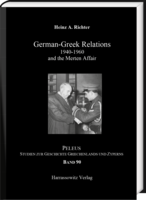|
|
more titles of the subject:
Download:
This study by. Heinz A. Richter describes the developments of the German—Greek relations from 1940 to 1960 focusing on the role of Max Merten, a military official during the German occupation of Greece, whose arrest in 1957 and release in 1959 despite a twenty-five year prison sentence, has long been the subject of speculation and conjecture.
Richter begins with the occupation of Greece and the organizational structures of the German army in Greece. It analyses the functions and competences of a “Kriegsverwaltungsrat” which was the function of Max Merten. In 1943, Merten was confronted with the deportations of the Salonika Jews ordered by the SS. His reactions are described in detail and it is proved that he helped the Jews a lot though he, and not his commander, was forced to sign the deportation orders of the SS. After the war a traditional problem of Greece turned up again. Since 1832, the budget of the Greek state had always had a gap which was closed by the protective powers, first by Britain and in connection with the Truman doctrine by the US. But the Eisenhower doctrine stopped these payments. Greece was forced to look for other income sources. Athens demanded reparations from Germany despite its ratification of the London debt Agreement, which postponed reparation payments only to the time after German reunification. This question of reparations was linked to the persecution of war criminals in Germany. When the negotiations did not lead to a solution, Athens used the opportunity of a trip of Merten to Athens to arrest him. In the subsequent trial he was sentenced to 25 years of prison but when Germany paid the expected sum, Merten was set free. Now the Merten affair became an object of German interior policy which implied Adenauer’s Secretary of State Hans Globke. This conflict found its way into the press, most prominently into Der Spiegel. CONTENT Introduction Merten in the early war years Merten and the prosecution of the Jews Merten in the postwar years Reparations and the Merten case Merten's fight for rehabilitation Merten's "treasures" Conclusions Bibliography Index of Names |






